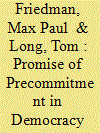| Srl | Item |
| 1 |
ID:
141482


|
|
|
|
|
| Summary/Abstract |
There is an apprehension in the democratic world about the possible impact of the economic rise of China on the UN human rights agenda. Although Communist China has embraced capitalism by liberalising its economy, by joining the WTO and by recognising private entrepreneurship and the right to private property, it has not been an enthusiastic partner when it comes to promoting and protecting human rights. China has supported the idea of so-called “Asian values”, or cultural and political relativism, as well as promoting the idea of a “China Model of Democracy”, which seeks to support economic growth at the expense of civil and political rights. This article examines China's approach to human rights both within and outside of the UN and whether China's rise as a major economic power poses a threat or offers an opportunity to the international human rights system led by the UN. In doing so, it considers how China is changing in terms of its approach to the rule of law, democracy and human rights and why it needs to become a willing and enthusiastic player within the UN system to promote and protect human rights. The author concludes that China will not pose a threat to the UN human rights agenda. One way or the other, the only way forward for China is to embrace the rule of law, and this will in turn entail respect for human rights. Thus, there is an opportunity for the UN to introduce human rights law and jurisprudence developed by the UN treaty bodies to the Chinese legal and constitutional system.
|
|
|
|
|
|
|
|
|
|
|
|
|
|
|
|
| 2 |
ID:
175833


|
|
|
|
|
| Summary/Abstract |
Although international precommitment regimes offer a tool to escape the apparent contradiction between sovereignty and the international protection of democracy and human rights, they raise theoretical and practical questions. This article draws on multinational archival research to explore an overlooked historical episode and suggest new thinking regarding the logjams over sovereignty, incapacity of global decision making, and humanitarian imperialism. In 1945 and 1946, the American states engaged in a debate over the Larreta Doctrine, a Uruguayan proposal about the parallelism between democracy and human rights, and the regional rights and duties to safeguard these values. In the ensuing debate, the Uruguayan foreign minister elaborated a tripartite precommitment mechanism to create a web of national commitments to democratic governance and the domestic protection of human rights, to establish a regional insurance policy against failures to maintain those commitments, and to obligate the great power and neighboring states to precommit to working through the regional system instead of unilaterally. As a proposal that emerged from a weak state—and garnered support from states that faced internal and external threats to democracy and rights—the Larreta Doctrine offers insights on the central tension between state sovereignty and international commitments.
|
|
|
|
|
|
|
|
|
|
|
|
|
|
|
|